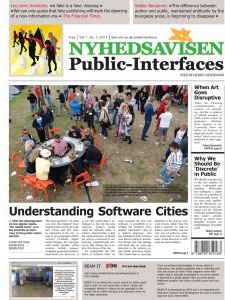Archives
-
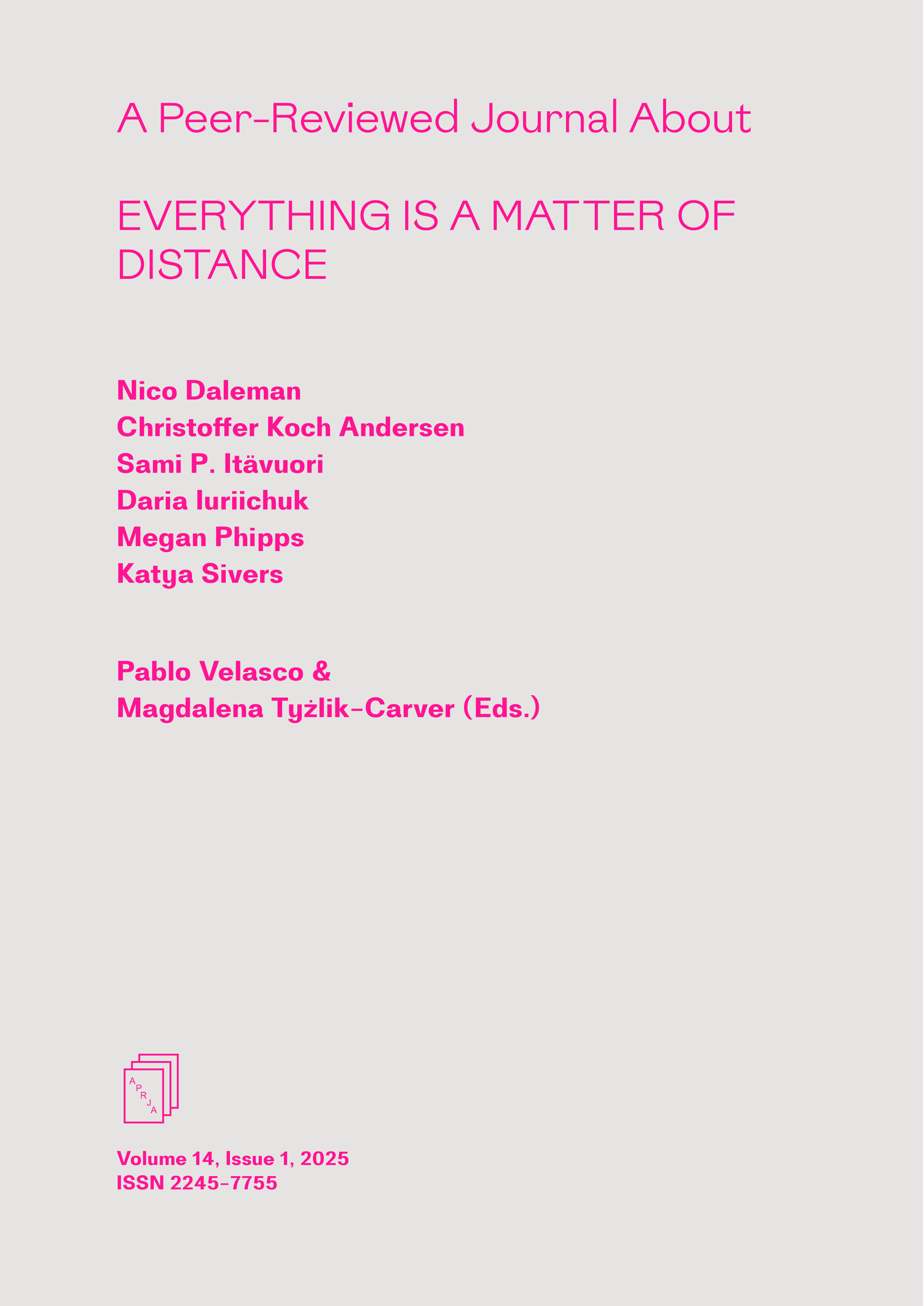
Everything Is A Matter Of Distance
Vol. 14 No. 1 (2025)In physics, distance is measured as the product of speed and time; in mathematics, it is defined as the total path travelled by an object from one point to another. Both definitions share an operational clarity but capture only a single dimension of the relationship between objects. The lived reality of distance—and its counterpart, proximity—resists such simplifications. One recurring question in the contributions of this journal issue is how space itself is produced, shaped, and manipulated in contemporary techno-culture. Proximity today is engineered through techniques of approximation—statistical modes of patterning identities, collectivities, and affective bonds to corporate infrastructures. Critical vocabularies have long privileged distance—critical distance, aesthetic distance—but we are already immersed in these approximations as we are addressed, enrolled, and captured through platforms and other interfaces of affective persuasion. The challenge, then, is to ask: how might critical digital culture research manoeuvre in this terrain?
-
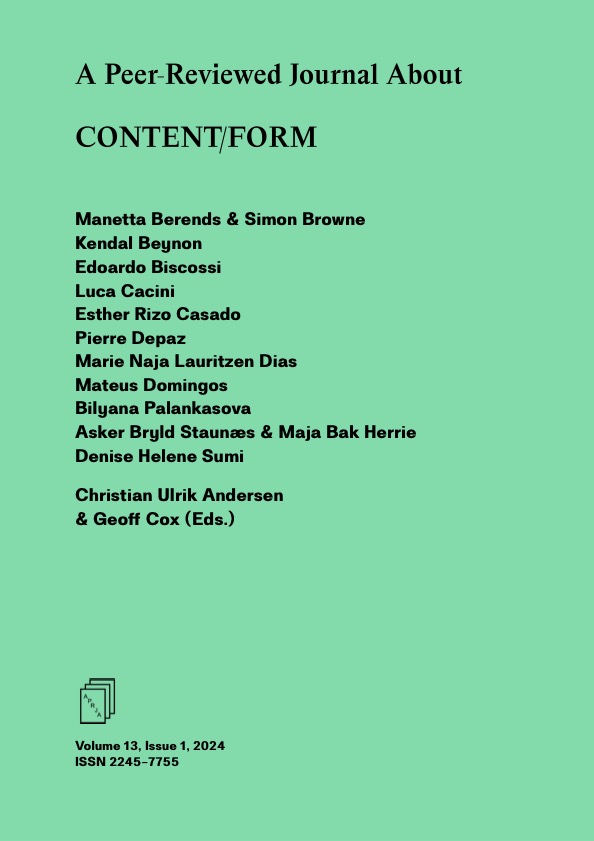
Content/Form
Vol. 13 No. 1 (2024)The delivery of content has become central to our algorithm-mediated realities – formed by and forming language, identities, behaviour, and action. Content cannot be separated from the forms through which it is rendered. If our attachment to standardised forms and formats – served to us by big tech – limit the space for political possibility and collective action, then this journal issue of APRJA asks what alternatives might be envisioned (including for research itself)? By exploring our relations to content and the forms through which it is made public, it takes an interest in the production and consumption of representation of content, the hyper-realities of content production, our troubled relation to content, the interfaces of content, the machinic production of our visual realities, the crisis of political imagination, and how this is reflected in aesthetic production, artistic research, and the broad field of software studies and interface criticism.
-
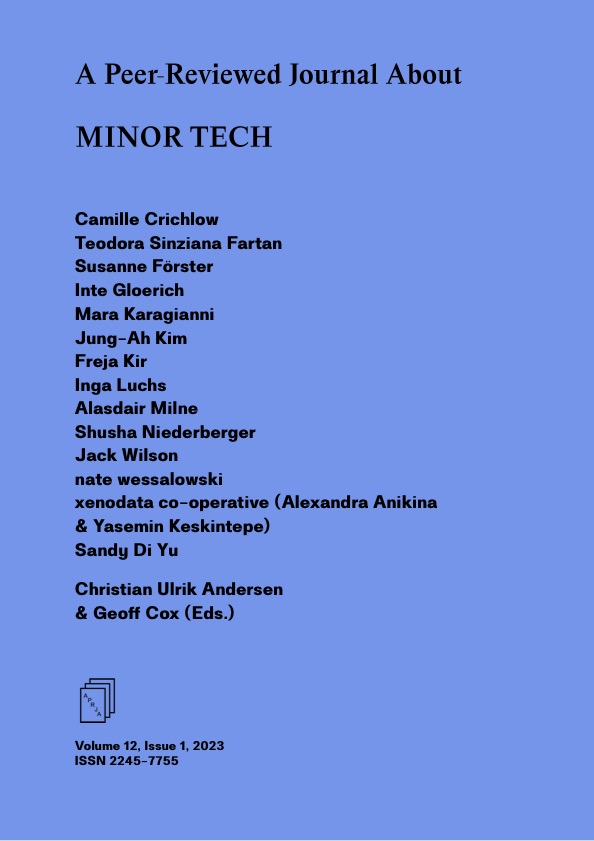
Minor Tech
Vol. 12 No. 1 (2023)This publication brings together researchers who address the problems of technological scale, thinking through the potentials of 'the minor'; or what we are referring to as minor (or minority) tech – small tech that operates at human scale (more peer to peer than server-client) and stutters in its expression and application. As Marloes de Valk puts it in the Damaged Earth Catalog: “Small technology, smallnet and smolnet are associated with communities using alternative network infrastructures, delinking from the commercial Internet.” As such, the publication sets out to question the universal ideals of technology and its problems of scale, extending it to follow the three main characteristics identified in Deleuze and Guattari's essay (Toward a Minor Literature), namely deterritorialization, political immediacy, and collective value.
-
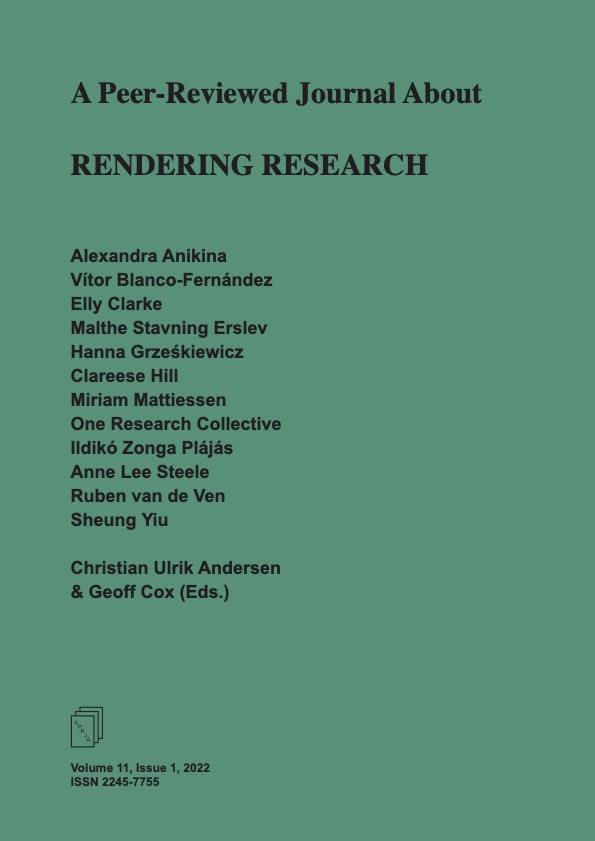
Rendering Research
Vol. 11 No. 1 (2022)To render is to give something “cause to be” or “hand over” (from the Latin reddere “give back”) and enter into an obligation to do or make something like a decision. More familiar perhaps in computing, to render is to take an image or file and convert it into another format or apply a modification of some kind; or in the case of 3D animation or scanning, to render is to animate it or give it volume. In this issue, we ask, what does it mean to render research? How does the rendering of research reinforce certain limitations of thought and action? We ask these questions in the context of more and more demands on researchers to produce academic outputs in standardised forms, in peer-reviewed journals and such like that are legitimised by normative values. So, then, how to render research otherwise?
-
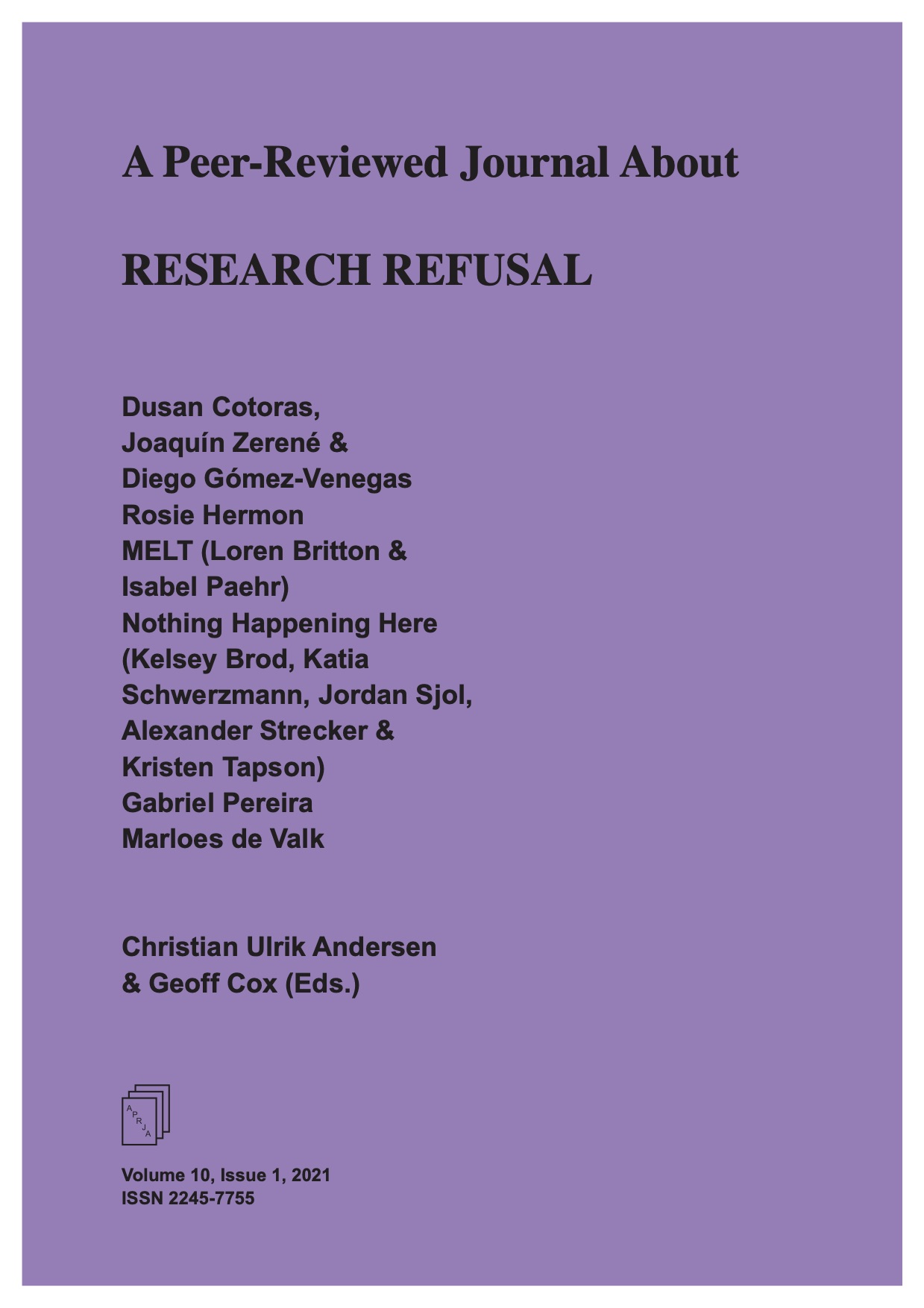
Research Refusal
Vol. 10 No. 1 (2021)Writing in 1965, Mario Tronti’s claim was that the greatest power of the working class is refusal: the refusal of work, the refusal of capitalist development, and the refusal to bargain within a capitalist framework. One can see how this "strategy of refusal" has been utilised in all sorts of instances by social movements, but how does this play out now in the context of wider struggles over autonomy today – not just in terms of labour power and class struggles; but also intersectional feminism and queer politics; race and decolonialism, geopolitics, populism, environmental concerns; and the current pandemic? In what ways does a refusal of production manifest itself in contemporary artistic, political, social, cultural, or other movements? And, how might a refusal of certain forms of production come together with a politics of care and "social closeness" – also when thinking of how research itself might be refused?
-
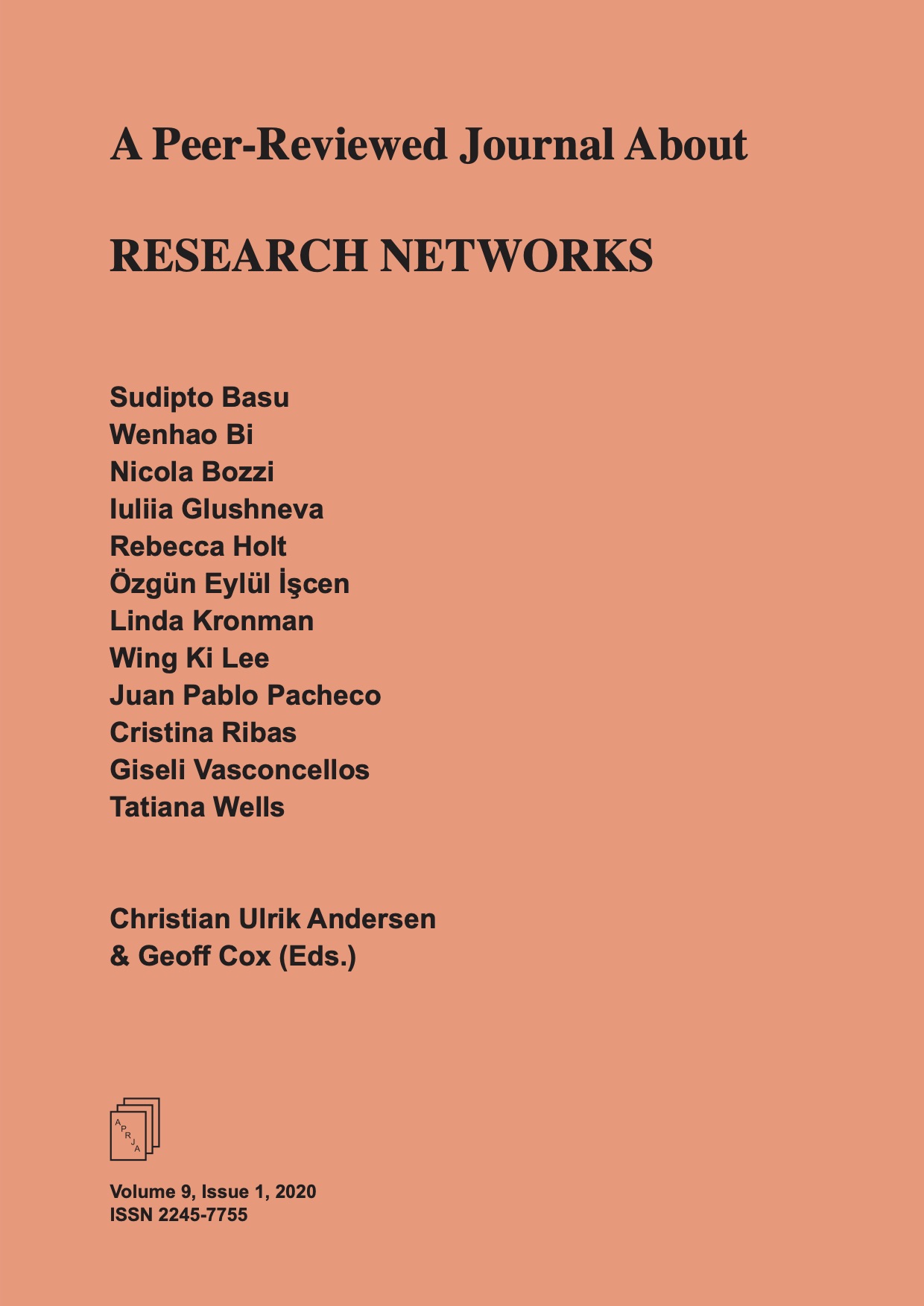
Research Networks
Vol. 9 No. 1 (2020)How do we think about networks under postdigital conditions? What does this imply for research? This journal issue takes as its outset, the call of the 2020 transmediale festival to “[leave] behind a decade marked by a backlash against the Internet and the network society” in order to re-evaluate the limits of ‘networks’. It refers to Robert Filliou’s “The Eternal Network,” an idealistic notion from the 1960s, pointing to the interconnectedness of everyday-life actions across an emerging global world at that time. This is a good reminder that network cultures exist beyond the technical reality of network culture as we now know it despite our primary identification of networks with social media and planetary computation. By drawing on the legacies of critical and autonomous network cultures, the aim of this journal issue is to make the limits of Internet-based networks visible but also highlight alternatives. Is there a conceivable counter-power to networks? Which alternative technological models and cultural narratives are needed to construct the principles of end-to-end communication anew? How might the critique of networks extend to non-western contexts and reflect the limits in a global perspective?
-
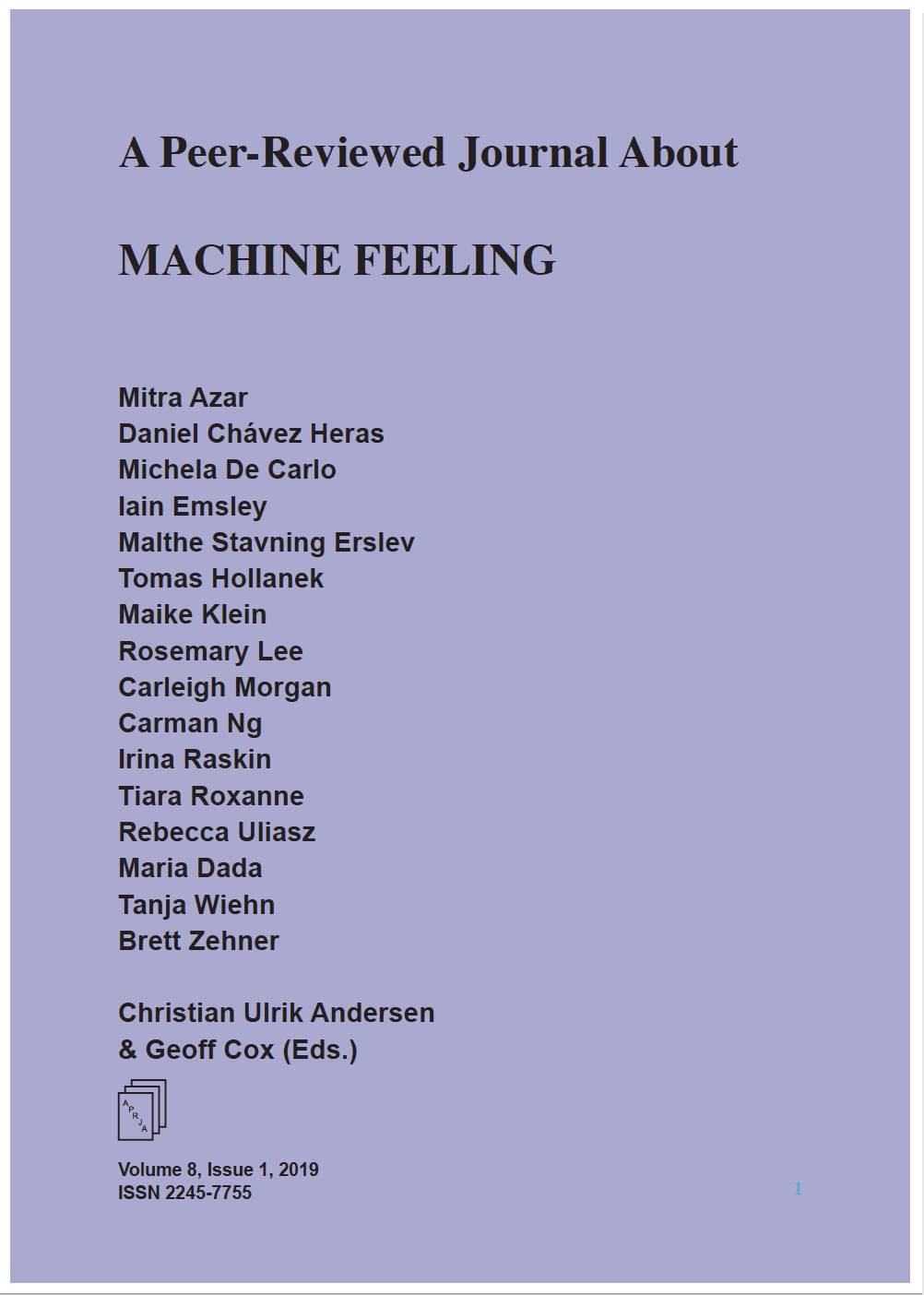
Machine Feeling
Vol. 8 No. 1 (2019)Digital culture has become instrumental for capturing and managing what Raymond Williams would once have called “structures of feeling”. The journal issue A Peer-Reviewed Journal About Machine Feeling alludes to this, and points to a material analysis of aesthetics and culture, including its technical and social forms, and in the way that this concept was originally employed as an acknowledgment of the importance of the hard to capture dimensions of everyday life. What potential new sensibilities and structures of feeling may arise in such normalized registers of our habits? What new cultural and social forms and practices emerge in the coming together of machine learning and structures of feeling? In each their own way, the authors in this journal explore these questions.
-
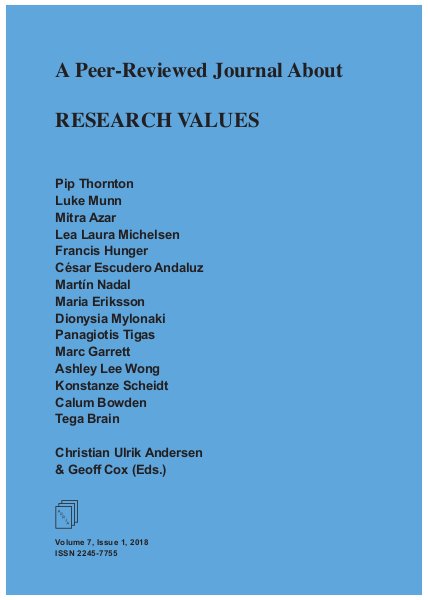
Research Values
Vol. 7 No. 1 (2018)A Peer-Reviewed Journal About Research Values interrogates value and values in ways that respond to techno-cultural shifts and embrace the range of economies that pervade digital culture. These include facing value and modes of subjectivation involved in both the sharing economy as well as in the use of biometrics; knowing values and the different ways of storing and regulating knowledge; activating values and the ways artists and activists may potentially address the conflation ofvalues and value in terms of cultural politics; and finally changing values to explore how processes of valuing and valorization seem to bend and evade fundamental relations to the world.
-
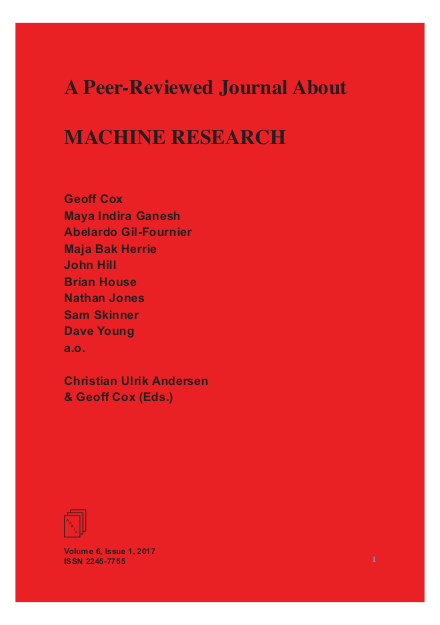
Machine Research
Vol. 6 No. 1 (2017)This publication is about Machine Research – research on machines, research with machines, and research as a machine. It thus explores machinic perspectives to suggest a situation where the humanities are put into a critical perspective by machine driven ecologies, ontologies and epistemologies of thinking and acting. It aims to engage research and artistic practice that takes into account the new materialist conditions implied by nonhuman techno-ecologies. Articles include new ontologies and intelligence such as machine learning, machine reading and listening, systems-oriented perspectives to broadcast communication and conflict, the ethics and aesthetics of autonomous systems, and other post-anthropocentric reconsiderations of materiality and infrastructure.
-
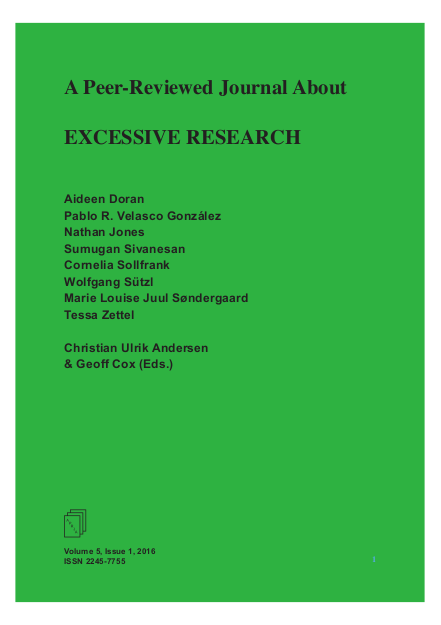
Excessive Research
Vol. 5 No. 1 (2016)Excessive Research highlights the compulsive actions of digital culture, and how we are constantly encouraged to stay active, to make, to share and to secure. While idealised by hackers, these actions are at the same time the conveyors of new agile innovation strategies, and modes of economic and symbolic exchange. A culture of sharing, for instance, is evidently one of the most fetishised activities of the network and describes how value is now created. ‘Sharing is caring’, goes the catchphrase, but by its inclination of excess, loss and indebtedness, sharing also challenges the very logic of accumulation, and hence it must be domesticated and normalised. Articles delve into the nature of these actions and their limits, asking: What happens when research is less about exchange and more about excess?
-
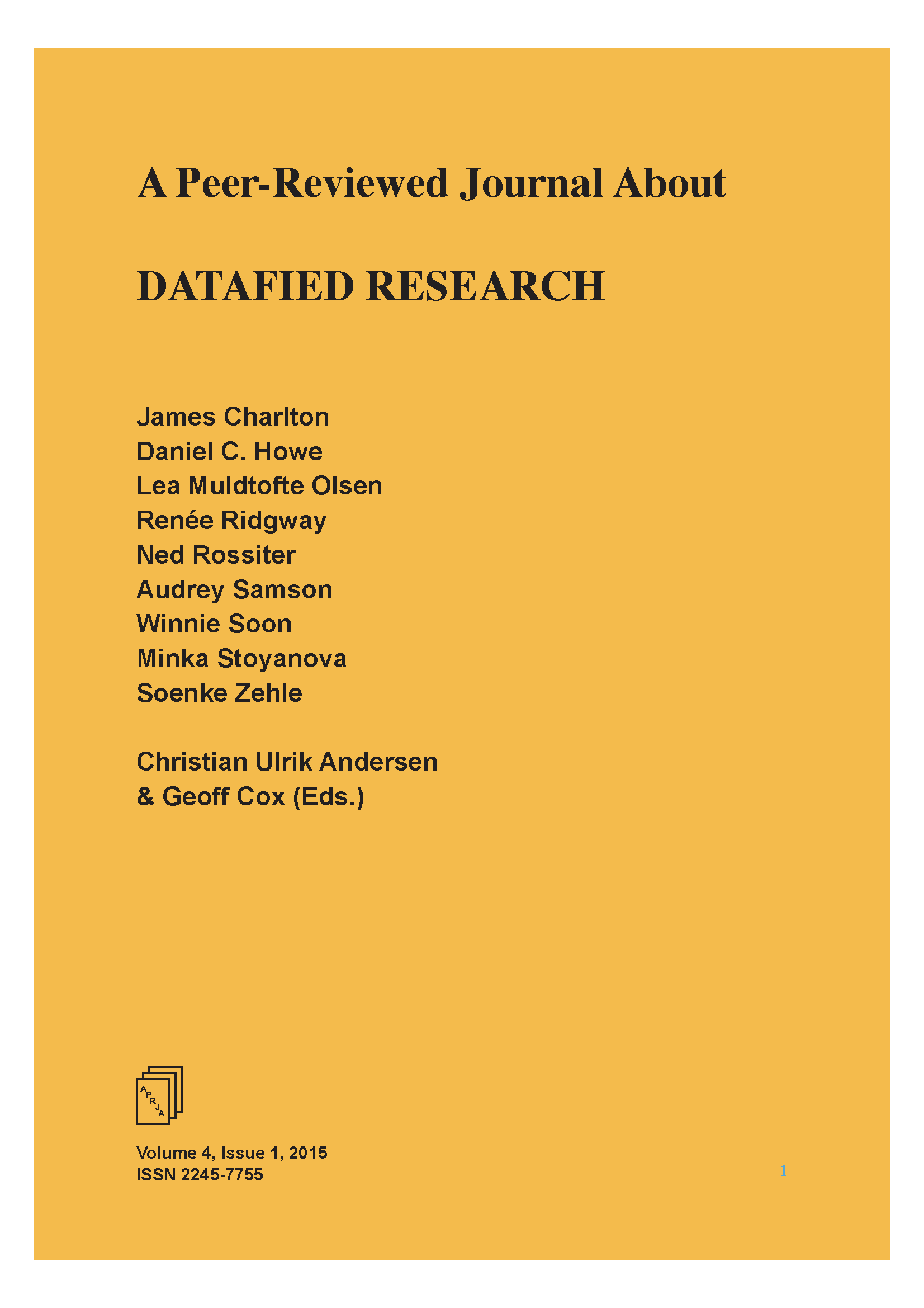
Datafied Research
Vol. 4 No. 1 (2015)This issue of APRJA examines the implications of datafication for research. The articles provide responses that outsmart and outplay the logic of capturing everything applied by the corporate as well as scientific communities. Each in their own way they address the complexity af 'capture', and examine datafication’s connection to commodification (and even to zombification), and examine alternatives such as obfuscation in order to know and unknow things at different registers and scales – from the grain of data to big data, the materiality of data and the politics of data structures, or in other ways afforded by emergent practices of datafied research.
-
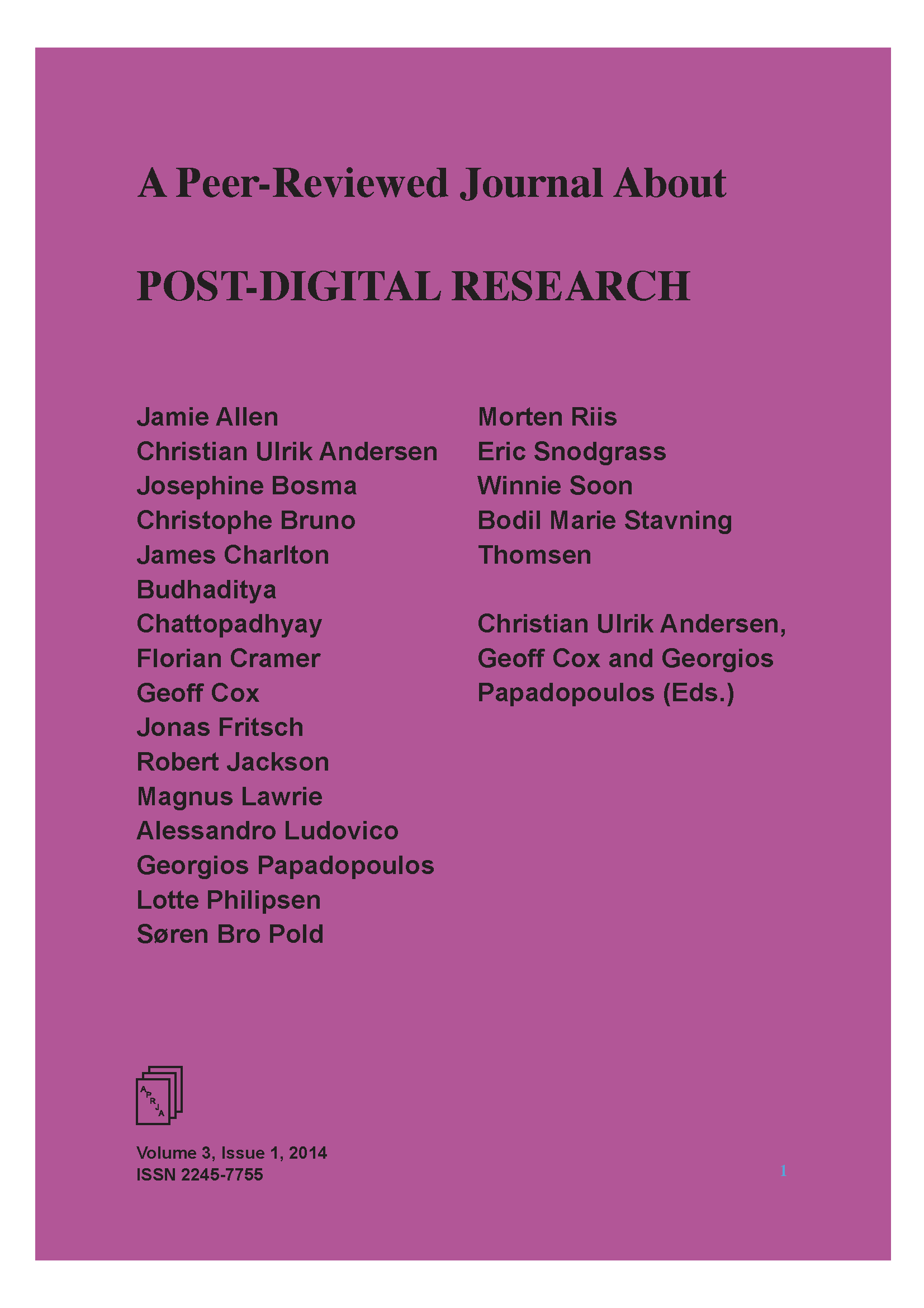
Post-digital Research
Vol. 3 No. 1 (2014)Although in many ways the post-digital “sucks but is useful” as Florian Cramer notes in his contribution, this issue of A Peer-Reviewed Journal About Post-Digital Research takes it to be a serious concept that deserves our critical attention. The journal issue is divided into three sections, that address the term itself, its genealogy and wider connotations, as well as its potential usefulness across different fields (including art, acoustics, aesthetic theory, political economy and philosophy). Given that the term comes from practice, it also addresses how the post-digital potentially operates as a framework for practice-based research that relate to material and historical conditions.
-
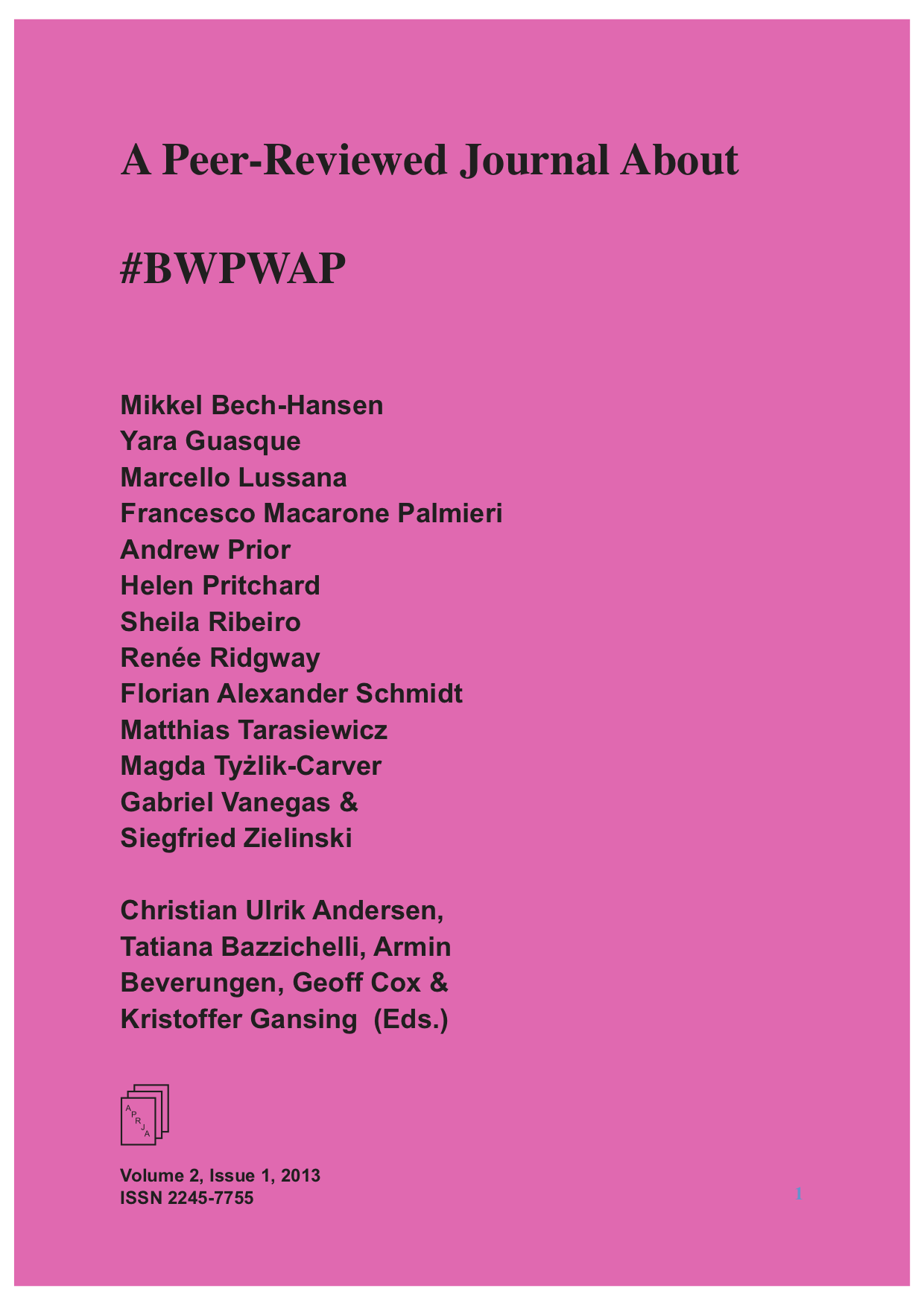
#BWPWAP
Vol. 2 No. 1 (2013)In referring to the cancellation of Pluto’s planetary status in 2006, #BWPWAP (Back When Pluto Was a Planet) – the 2013 edition of the transmediale festival – interrogates techno-cultural processes of displacement and invention, and asks for artistic and speculative responses to new cultural imaginaries. In light of this, the conference and workshop Researching #BWPWAP took place in November 2012 in Lüneburg, Germany, organised jointly by Leuphana University of Lüneburg, Aarhus University and the reSource transmedial culture/transmediale. This issue presents some outcomes of this process, and like the conference and workshop, can be interpreted in the context of a research culture that has been significantly destabilized by network culture and digital media. If the planet Pluto didn’t exactly fall prey to an epistemological break or a scientific revolution, but rather to a mundane administrative procedure – a redefinition of what constitutes a planet – then what does this say about contemporary research culture?


